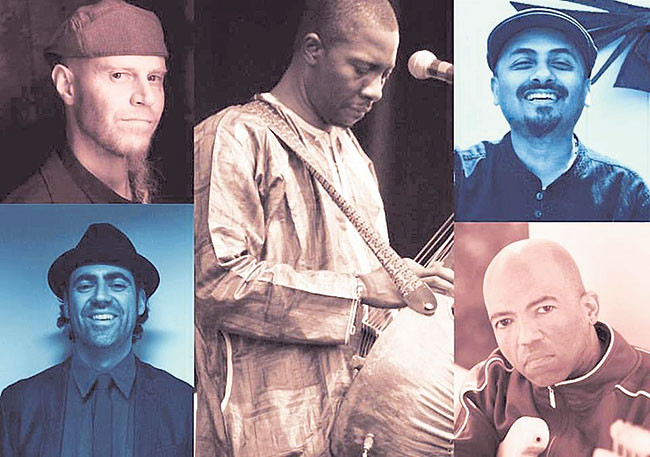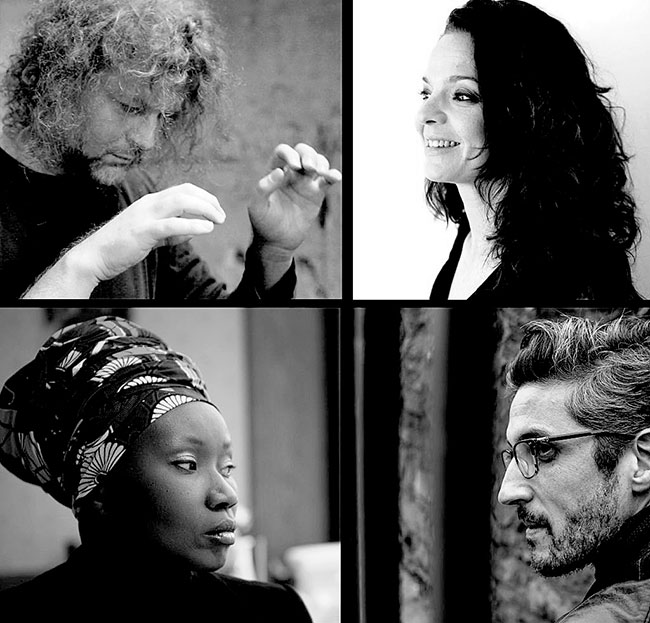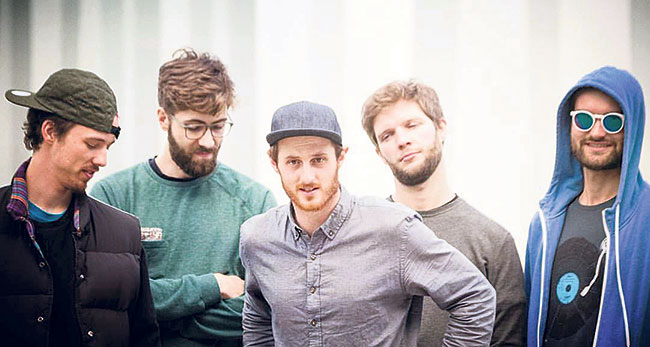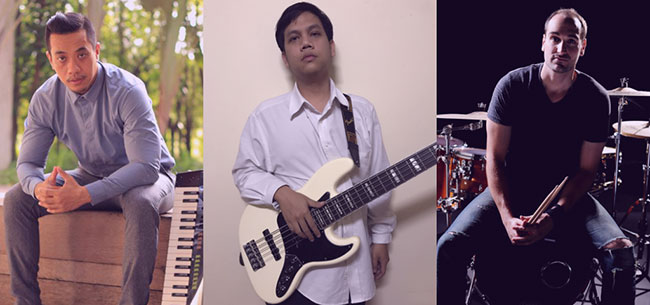Jazz may not be everybody’s cup of tea, but the Kathmandu Jazz Festival continues to put up a strong case for it. They are in their 15th year already and, in all this while, they have managed to sway many Nepalis – literally and figuratively – over to their side with their sounds and music.
So it’s no wonder that many people in Kathmandu, both young and old, are busy fixing their schedule to fit in an event or two of the Jazz festival for it’s that time of the year again. Valley jam, jazz bazaar, master classes, and jazz workshops are all back with a bang. Surya Nepal Jazzmandu 2017 started on October 12th and it will be a week-long affair.
The last time we talked to the organizers most of their international artists had already touched down in Kathmandu so The Week had a little chat with them about their expectations and plans for the biggest jazz party in the Himalayas this year.
Filtron M
 Manu Koch is a Swiss pianist and composer based in New York City. The Nepali audience first got a dose of his sound back in 2013 at Jazzmandu itself and this year will mark his third time performing at the festival. And this time around, he will be strumming up something new.
Manu Koch is a Swiss pianist and composer based in New York City. The Nepali audience first got a dose of his sound back in 2013 at Jazzmandu itself and this year will mark his third time performing at the festival. And this time around, he will be strumming up something new.
In the coming days, Koch plans to play with his project, Filtron M, a project that brings together the many genres and musical cultures he encountered while touring the world. It shall be a premier, of sorts, for the Nepali audience. Here he shares more about his music.
How important is it for you to represent your own culture through your music in international festivals like these?
I'm very thankful for every opportunity I get to perform with Filtron M. The culture I represent is not tied to one particular country though. Putting it in words it sounds like a utopian, borderless world but in music it becomes real. All the musicians participating in Filtron M bring their own cultural background into the mix and I want to make sure these elements can blend into every performance.
What keeps bringing you back to Jazzmandu?
It's always a very special experience for all the musicians involved because of Jazzmandu's various locations and enthusiastic audience. That's all we can ask for as performers.
International Jazz Day being celebrated today

Have these stints helped you familiarize yourself with Nepal’s music?
Every time I come to Nepal, I definitely get exposed to Nepali music at the festival with groups like Gandharva or Dhrupad Caravan. A lot of the music has a strong spiritual element that is very inspiring.
Since this is my third time, I already had a chance to perform with many Nepali musicians as well. I have collaborated with Navin Chettri's Cadenza, as well as his project Goonj that I participated in twice in New York playing his compositions as well as some traditional music we reinterpreted. I also had the chance to play with traditional instrumentalists from Nepal and these collaborations are always a highlight.
Julia Sarr Quartet
 “This year, I have got myself a month-long visa for Nepal,” shares Brunal Paris, “I want to meet other Nepalis or foreign musicians settled here,” he adds. This is his fourth time participating in Jazzmandu and over time he has apparently become a friend of the organizers. Not only does he enjoy playing in Kathmandu for the people and for his love for music, he says he has also been helping to connect and bring artists of high quality to the festival. He is more than happy to talk about his future plans regarding Jazzmandu.
“This year, I have got myself a month-long visa for Nepal,” shares Brunal Paris, “I want to meet other Nepalis or foreign musicians settled here,” he adds. This is his fourth time participating in Jazzmandu and over time he has apparently become a friend of the organizers. Not only does he enjoy playing in Kathmandu for the people and for his love for music, he says he has also been helping to connect and bring artists of high quality to the festival. He is more than happy to talk about his future plans regarding Jazzmandu.
What are you looking forward to the most in this year’s jazz festival?
Other than an opportunity to share with young musicians, perhaps collaborate with KJC as well, this year I have the chance to perform with the singer Julia Sarr. Her repertoire is original because she sings in her native language i.e. Wolof. The group is evolving in rhythmic and poetic energies, so that’s going to be a big highlight for me. We have already met to prepare for our concerts as well. It is a mix between African song, jazz and pop. I’m very much looking forward to it.
Since you are keen on the sharing and teaching aspect, could you recommend a few artists/ songs for our readers?
Picking just a couple from so many amazing artists is always difficult but I guess I could recommend a few artists who have guided me over the years with their work.
Artists like Wayne Shorter and the duo Keith Jarrett/Charlie Haden will always be in my heart. Wayne Shorter is someone who passionately embraced electric jazz-fusion. One of Shorter’s bestselling albums is Native Dancer. This was back in the 70s but is a Brazilian oriented jazz-fusion masterpiece of sorts.
When Keith Jarrett and Charlie Haden released their duet it was critically acclaimed. It was like two of the greatest living jazz players uniting to bring this progressive, spontaneous collaborations. Many call it a great moment in music.
As for the young guns, I’d recommend the likes of Robert Glasper or Avishai Cohen. Glasper is an American pianist but he often gravitates towards hip-hop. Cohen is a jazz bassist, composer, singer and arranger, originally from Tel Aviv. So his musical spectrum spans from classical and jazz, through to Arab and then some more. All of them account for very interesting work.
Samuel Wootton’s Toy Story
 We hear, in Samuel Wootton’s Toy Story, the stage is a playground where five musicians tell their fantastic tales. They combine the improvisational freedom of jazz, the deep grooves of hip-hop, the intimacy of chamber music and unique aesthetics from many of the world’s musical cultures to create a sound that defies categorization. Samuel leads the band and he says they are proud to be the second Hamburg band to be invited to Jazzmandu.
We hear, in Samuel Wootton’s Toy Story, the stage is a playground where five musicians tell their fantastic tales. They combine the improvisational freedom of jazz, the deep grooves of hip-hop, the intimacy of chamber music and unique aesthetics from many of the world’s musical cultures to create a sound that defies categorization. Samuel leads the band and he says they are proud to be the second Hamburg band to be invited to Jazzmandu.
In the interview, he told us that he believes the festival has wonderful potential. “Not only do we play several concerts, but one is also part of the central mission of furthering the cultural exchange between Nepali musicians, international musicians and the public. It’s wonderful,” he said. Here he reveals what he can expect from their set.
As a band, how do you prepare for live performances?
Together with our audience we hope to create a space for stimulation and reflection. The storytellers are Percussion – Samuel Wootton, Drums – Silvan Strauss, Reeds – Sebastian Wehle, Guitars – Alex Eckert and Bass – Daniel Stritzke.
The Bandleader’s earthy rhythms and unique melodies are tales that are retold with humor, insatiable curiosity and passion. We are inspired by one another’s creativity and this interaction forms the basis for solo sequences. The result is exuberant original music that defies categories. An extensive collection of percussion instruments from many different cultures adds special spice to our performance. We hope the audience will be invigorated and refreshed.
Have you made any specific preparations for Jazzmandu?
We will have to improvise a little bit on our set up because we can´t bring all our own percussion instruments. But this is the great essence of Jazz. It is an art form that enables the thrill of creating spontaneously, in direct response to impressions, circumstances and locations. So we are ready.
Teerapoj Plitakul Trio
 These guys are a cross continental collaboration led by the pianist and composer Teerapoj Plitakul who says, this time, he is bringing his new trio bassist, Nutchapon Choosakul from Bangkok, Thailand, David Parente from Miami, Florida as well as many original works. “It’s going to be fun,” he says.
These guys are a cross continental collaboration led by the pianist and composer Teerapoj Plitakul who says, this time, he is bringing his new trio bassist, Nutchapon Choosakul from Bangkok, Thailand, David Parente from Miami, Florida as well as many original works. “It’s going to be fun,” he says.
Teerapoj’s style has been honed through his collaborations with an array of Thai and international artists. You can detect a lot of groove and funk in there. US-born drummer David Parente also happens to be a regular on the Bangkok scene and has two decades of experience as a performing. Together with their seasoned bassist Choossakul, they have presented on many Asian stages. So we started by asking them how they got in touch with Jazzmandu.
How did you get connected with the organizers of Jazzmandu?
I actually applied on the website. This was back in 2012. Jazzmandu asks for ‘artist submission’ and I sent in our information as well as work. Back then I was with my old project band called Rootman. Now, with a new trio, I wanted to connect with the Jazzmandu team again. They agreed and asked us to come over, so here we are.
What do you think influences your music?
The thing with jazz is that each musician has his or her own style and sound. Their culture as well as exposure that they have had over the years makes the performances more special. It’s always a fusion. I think these factors contribute to our band as well.
Festivals like these are a great way to expand your musical knowledge as well. I have visited Nepal multiple times now, and I have been acquainted to the country’s traditional music as well. In fact I’m in love with it. It’s not only a good sound but a special one as well. The best part is that when a musician plays you can hear the country’s culture.




































